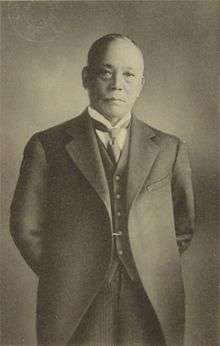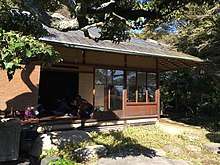Yamamoto Jōtarō
Yamamoto Jōtarō (山本条太郎, October 11, 1867 – March 25, 1936) was a bureaucrat, politician and entrepreneur in late Meiji and early Taishō period Empire of Japan. He is noted for his involvement in the Siemens scandal of 1914 and in the development of the South Manchurian Railway.
Yamamoto Jōtarō 山本条太郎 | |
|---|---|
 Yamamoto Jōtarō | |
| Born | October 11, 1867 |
| Died | March 25, 1936 (aged 68) Tokyo, Japan |
| Nationality | Japanese |
| Known for | development of South Manchurian Railway |

Biography
A native of what is now part of the city of Echizen, Fukui Prefecture, Yamamoto attended (but did not graduate) from the Kaisei Academy. He worked for Mitsui Bussan’s Yokohama branch office, which was heavily involved in foreign trade, and rose rapidly through the corporate ranks, becoming a Director of Mitsui by 1909. He was forced to resign from Mitsui in 1914, after being implicated in the Siemens Bribery Scandal, a spectacular political scandal involving collusion between several high-ranking members of the Imperial Japanese Navy, Mitsui, and the German industrial conglomerate Siemens AG.
After Yamamoto resigned, he became an entrepreneur, and started several companies. He also turned his attention to politics, and ran for the House of Representatives of Japan under the Rikken Seiyūkai political party in 1920. He was reelected five consecutive times.
From 1927 to 1929, under the sponsorship of Prime Minister Tanaka Giichi, Yamamoto was made Chairman of the semi-governmental South Manchurian Railway Company, presiding over a period of successful expansion for the company. One of his first tasks was to negotiate leases to permit the building of two additional spur lines directly with Fengtian clique warlord Zhang Zuolin, circumventing the Japanese Ministry of Foreign Affairs. This act of independent diplomacy was authorized by Tanaka, who also held the portfolio of Foreign Minister as well as Prime Minister.[1] Yamamoto also worked closely with the Japanese Consul-General in Mukden, Shigeru Yoshida, in influencing the foreign policy of the Tanaka administration into a stronger stance to promote Japanese economic interests in northern China.[2] However, the Huanggutun Incident, the assassination of Zhang Zuolin by agents of the Kwantung Army also occurred during his tenure, and he was forced into retirement.
His summer villa was located in Kamakura and is designated a Registered tangible cultural property (building).[3]
Yamamoto was also known as a master of the Japanese tea ceremony, a pursuit to which he devoted his retirement years. His grave is at the Tama Cemetery in Fuchū, Tokyo.
References
- Young, Louise (1999). Japan's Total Empire: Manchuria and the Culture of Wartime Imperialism. University of California Press. ISBN 0-520-21934-1.
- Sims, Richard (2001). Japanese Political History Since the Meiji Renovation 1868–2000. Palgrave Macmillan. ISBN 0-312-23915-7.
- Tsuzuki, Chushichi (2000). Japan Since 1825: Modern Japan 1825–1995. Oxford University Press. ISBN 0-19-820589-9.
- Nish, Ian (2002). Japanese Foreign Policy in the Interwar Period. Greenwood Publishing Group. ISBN 0-275-94791-2.
References
- Nish, Japanese Foreign Policy in the Interwar Period. page 58
- Tsuzuki, Japan Since 1825: Modern Japan 1825–1995. page 227–229
- https://bunka.nii.ac.jp/heritages/detail/273432/1
External links
![]()